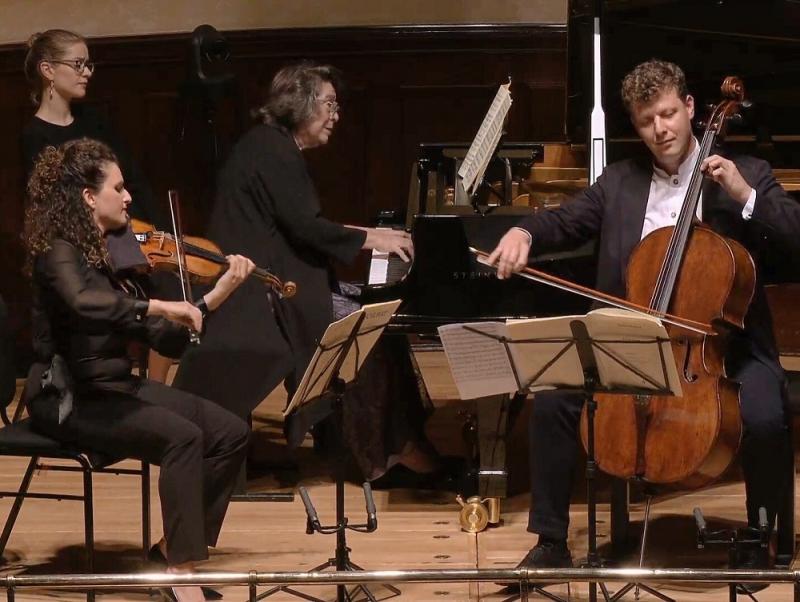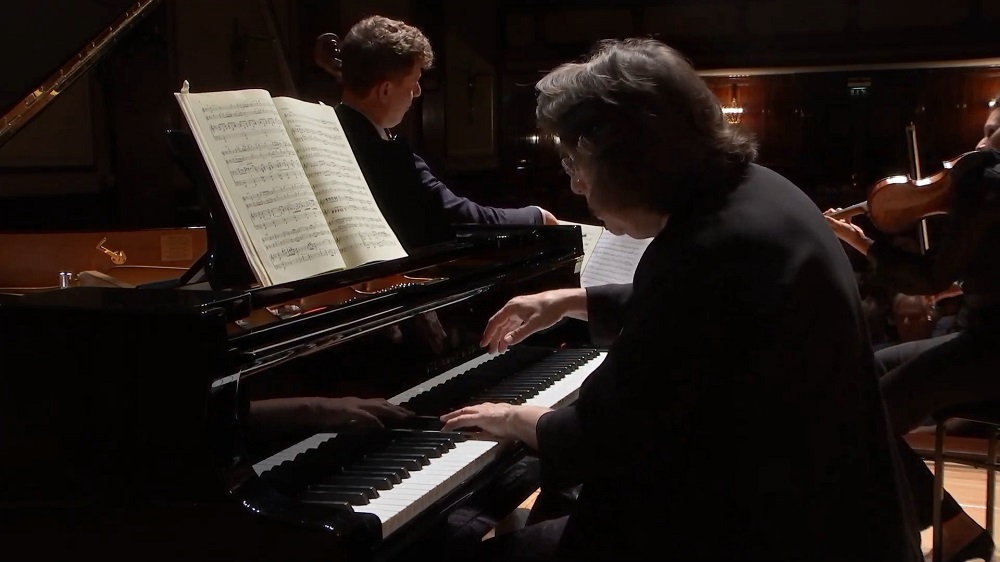Leonskaja, Ferschtman, Várdai, Wigmore Hall review - direct line to Schubert's genius | reviews, news & interviews
Leonskaja, Ferschtman, Várdai, Wigmore Hall review - direct line to Schubert's genius
Leonskaja, Ferschtman, Várdai, Wigmore Hall review - direct line to Schubert's genius
Three peerless players clarify the wonders of the composer's two late piano trios

From the epic-lyric heaven storming of Beethoven's last three piano sonatas to the lyric-epic dances on the volcano of Schubert's two late piano trios isn't so big a leap, especially when you have the clairvoyant poise between colossal and intimate of the great Elisabeth Leonskaja.
It isn't clear which of the two trios was composed first, though both appeared on the public scene in the last year and a bit of Schubert's short life. Evidently, though, the numbering means that the panoramic E flat major glory should follow the more modest, but still unmistakeably late-Schubert D.898. The third theme of its otherwise blithe first-movement exposition suddenly points to the open grave; it was handled with typical subtlety by the trio, ever so slightly different second time around. And Várdai sang his Andante melody with perfect poise; there's never excess sentimentality with these players, only exquisite grace counterpoised with a more Promethean aspect in which Leonskaja gives the lead. Her bigger, more bass-freighted chords were perfectly weighted, never overdone but not discreet for the sake of the strings, either; and in flyaway right-hand filigree she showed her mastery of Schubert's more intimate side.  In the E flat masterpiece, miracle upon miracle seemed to unfold. This time the last of the opening subject-group has even more pathos in a single, unforgettable phrase, even more internalised in the repeat so as to lead to Schubert's painstaking exploration of its possibilities in the development. The sprung accompaniments to the slow movement's plaintive song - again perfectly inflected by Várdai, this time with even more colour - always amazed, especially in Leonskaja's hands, and the explosion at the core was terrifying, heart-stopping.
In the E flat masterpiece, miracle upon miracle seemed to unfold. This time the last of the opening subject-group has even more pathos in a single, unforgettable phrase, even more internalised in the repeat so as to lead to Schubert's painstaking exploration of its possibilities in the development. The sprung accompaniments to the slow movement's plaintive song - again perfectly inflected by Várdai, this time with even more colour - always amazed, especially in Leonskaja's hands, and the explosion at the core was terrifying, heart-stopping.
The codas of both these movements took us further than you thought it was possible to go - and the same was true about the whole of Schubert's heavenly length in the finale. So much so that you could only feel "get out of that" when the sad song of the Andante con moto interposed itself yet again; by sleight of hand he, and his ideal interpreters, absolutely and emphatically did, at the very last minute. Even then the tiny breathing spaces of a perfect chamber team and the placing of the final chord were wrought with infinite care. You left thinking, what great music first, what great players second, which is as it should be. Glorious, unsurpassable.
rating
Share this article
Add comment
The future of Arts Journalism
You can stop theartsdesk.com closing!
We urgently need financing to survive. Our fundraising drive has thus far raised £49,000 but we need to reach £100,000 or we will be forced to close. Please contribute here: https://gofund.me/c3f6033d
And if you can forward this information to anyone who might assist, we’d be grateful.

Subscribe to theartsdesk.com
Thank you for continuing to read our work on theartsdesk.com. For unlimited access to every article in its entirety, including our archive of more than 15,000 pieces, we're asking for £5 per month or £40 per year. We feel it's a very good deal, and hope you do too.
To take a subscription now simply click here.
And if you're looking for that extra gift for a friend or family member, why not treat them to a theartsdesk.com gift subscription?
more Classical music
 First Person: Manchester Camerata's Head of Artistic Planning Clara Marshall Cawley on questioning the status quo
Five days of free events with all sorts of audiences around Manchester starts tomorrow
First Person: Manchester Camerata's Head of Artistic Planning Clara Marshall Cawley on questioning the status quo
Five days of free events with all sorts of audiences around Manchester starts tomorrow
 Goldscheider, Brother Tree Sound, Kings Place review - music of hope from a young composer
Unusual combination of horn, strings and electronics makes for some intriguing listening
Goldscheider, Brother Tree Sound, Kings Place review - music of hope from a young composer
Unusual combination of horn, strings and electronics makes for some intriguing listening
 theartsdesk Q&A: composer Donghoon Shin on his new concerto for pianist Seong-Jin Cho
Classical music makes its debut at London's K-Music Festival
theartsdesk Q&A: composer Donghoon Shin on his new concerto for pianist Seong-Jin Cho
Classical music makes its debut at London's K-Music Festival
 Helleur-Simcock, Hallé, Wong, Bridgewater Hall, Manchester review - moving lyricism in Elgar’s concerto
Season opener brings lyrical beauty, crisp confidence and a proper Romantic wallow
Helleur-Simcock, Hallé, Wong, Bridgewater Hall, Manchester review - moving lyricism in Elgar’s concerto
Season opener brings lyrical beauty, crisp confidence and a proper Romantic wallow
 Kohout, Spence, Braun, Manchester Camerata, Huth, RNCM, Manchester review - joy, insight, imagination and unanimity
Celebration of the past with stars of the future at the Royal Northern College
Kohout, Spence, Braun, Manchester Camerata, Huth, RNCM, Manchester review - joy, insight, imagination and unanimity
Celebration of the past with stars of the future at the Royal Northern College
 Jansen, LSO, Pappano, Barbican review - profound and bracing emotional workouts
Great soloist, conductor and orchestra take Britten and Shostakovich to the edge
Jansen, LSO, Pappano, Barbican review - profound and bracing emotional workouts
Great soloist, conductor and orchestra take Britten and Shostakovich to the edge
 Jakub Hrůša and Friends in Concert, Royal Opera review - fleshcreep in two uneven halves
Bartók kept short, and a sprawling Dvořák choral ballad done as well as it could be
Jakub Hrůša and Friends in Concert, Royal Opera review - fleshcreep in two uneven halves
Bartók kept short, and a sprawling Dvořák choral ballad done as well as it could be
 Hadelich, BBC Philharmonic, Storgårds, Bridgewater Hall, Manchester review - youth, fate and pain
Prokofiev in the hands of a fine violinist has surely never sounded better
Hadelich, BBC Philharmonic, Storgårds, Bridgewater Hall, Manchester review - youth, fate and pain
Prokofiev in the hands of a fine violinist has surely never sounded better
 Monteverdi Choir, ORR, Heras-Casado, St Martin-in-the-Fields review - flames of joy and sorrow
First-rate soloists, choir and orchestra unite in a blazing Mozart Requiem
Monteverdi Choir, ORR, Heras-Casado, St Martin-in-the-Fields review - flames of joy and sorrow
First-rate soloists, choir and orchestra unite in a blazing Mozart Requiem
 Cho, LSO, Pappano, Barbican review - finely-focused stormy weather
Chameleonic Seong-Jin Cho is a match for the fine-tuning of the LSO’s Chief Conductor
Cho, LSO, Pappano, Barbican review - finely-focused stormy weather
Chameleonic Seong-Jin Cho is a match for the fine-tuning of the LSO’s Chief Conductor
 Classical CDs: Shrouds, silhouettes and superstition
Cello concertos, choral collections and a stunning tribute to a contemporary giant
Classical CDs: Shrouds, silhouettes and superstition
Cello concertos, choral collections and a stunning tribute to a contemporary giant
 Appl, Levickis, Wigmore Hall review - fun to the fore in cabaret and show songs
A relaxed evening of light-hearted fare, with the accordion offering unusual colours
Appl, Levickis, Wigmore Hall review - fun to the fore in cabaret and show songs
A relaxed evening of light-hearted fare, with the accordion offering unusual colours

Comments
I agree completely, last line